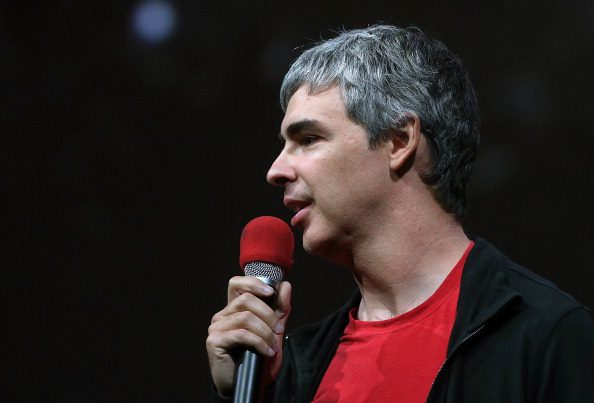
Lawrence Edward Page, who co-founded Google Inc. along with Sergey Brin, is now heading up the search engine’s parent company, Alphabet Inc., to not only make Google stronger, but also more clearly focus on “Other Bets” such as artificial intelligence, self-driving cars, drones and expanding life expectancy.
In 2015, Alphabet was formed as a holding company for Google and what it calls Other Bets on its balance sheet — independent operating units that so far, do not meet “the quantitative thresholds to qualify as reportable segments,” including Access, Calico, CapitalG, GV, Nest, Verily, Waymo, and X. Google, now streamlined, includes the main internet products, such as Search, Ads, Commerce, Maps, YouTube, Google Cloud, Android, Chrome, and Google Play, as well as hardware initiatives, technical infrastructure and some newer efforts like virtual reality.
“As Sergey and I wrote in the original founders letter 11 years ago, “Google is not a conventional company. We do not intend to become one,” Page blogged in August 2015 after the restructuring. “As part of that, we also said that you could expect us to make ‘smaller bets in areas that might seem very speculative or even strange when compared to our current businesses.’ From the start, we’ve always strived to do more, and to do important and meaningful things with the resources we have.”
“We did a lot of things that seemed crazy at the time,” he wrote. “Many of those crazy things now have over a billion users, like Google Maps, YouTube, Chrome, and Android. And we haven’t stopped there. We are still trying to do things other people think are crazy but we are super excited about.”
“We’ve long believed that over time companies tend to get comfortable doing the same thing, just making incremental changes,” Page wrote. “But in the technology industry, where revolutionary ideas drive the next big growth areas, you need to be a bit uncomfortable to stay relevant.”
“Our company is operating well today, but we think we can make it cleaner and more accountable,” he wrote. “So we are creating a new company, called Alphabet. I am really excited to be running Alphabet as CEO with help from my capable partner, Sergey, as president.”
Google continues to be Alphabet’s cash cow, generating $89.5 billion in revenues in 2017, compared to $0.8 billion for Other Bets. Within Google, advertising revenue continues to expand as the company localizes its various internet products for emerging markets, and non-advertising revenues have also grown through products and services like Google Cloud, Google Play and hardware products.
Alphabet is investing heavily research and development in areas of strategic focus for Google, such as search, advertising, and machine learning, as well as in new products and services across both Google and Other Bets, the company wrote in its annual report.
“In addition, acquisitions remain an important part of our strategy and use of capital, and we expect to continue to spend cash on acquisitions and other investments,” the company wrote. “These acquisitions generally enhance the breadth and depth of our offerings, as well as expand our expertise in engineering and other functional areas.”
The restructuring has made it simple for investors to value the dollars coming from Google as distinct from the performance of the rest of Alphabet’s units, wrote Fast Company’s Harry McCracken.
“By giving the Google operating unit more focus, the organization can adapt more swiftly and become a better version of itself,” McCracken wrote. “The same holds true for Alphabet’s other business units, which now have their own autonomy—and expectations.”
FC’s David Lidsky wrote that Page picked the perfect time to reset his company — at the very moment that analysts were heralding Peak Google. “He knew that traditional corporate structure limits innovation at the pace he wants and needs,” Lidsky wrote. “He broke his business into smaller pieces to make them simpler and focused them more narrowly to discourage drift and distraction, while trying to maintain the advantages of scale and resources and a compelling culture to recruit talent.”
FC’s Austin Carr wrote that investments in Other Bets can also be viewed as a marketing expense.
“If there’s anything the Mountain View, California–based tech company effectively manufactures, it’s the mythology around itself,” Carr wrote. “These fantastical ideas create a glowing halo around the company, fostering the perception that Alphabet is a place where magic happens, where the most innovative minds, from iPod creator Tony Fadell to life sciences’ chief Andy Conrad, come to tinker.”
Many of Page’s bets, such as Nest, the smart-home-products company, have significant potential to benefit Alphabet’s business in the long term, he wrote.
“And in the near term they reinforce a distinctive culture,” Carr wrote. “Which, by the way, may be the best advertising of all.”
He’s No. 26 on Chief Executive and RHR International’s CEO1000 Tracker, a ranking of the top 1,000 public/private companies.
Headquarters: Mountain View, CA
Age: 45
Education: University of Michigan (B.S), Stanford University (M.S, PhD)
Co-founded Google: 1998
Google’s IPO: 2004
Assume CEO position with Alphabet: 2015


0

1:00 - 5:00 pm
Over 70% of Executives Surveyed Agree: Many Strategic Planning Efforts Lack Systematic Approach Tips for Enhancing Your Strategic Planning Process
Executives expressed frustration with their current strategic planning process. Issues include:
Steve Rutan and Denise Harrison have put together an afternoon workshop that will provide the tools you need to address these concerns. They have worked with hundreds of executives to develop a systematic approach that will enable your team to make better decisions during strategic planning. Steve and Denise will walk you through exercises for prioritizing your lists and steps that will reset and reinvigorate your process. This will be a hands-on workshop that will enable you to think about your business as you use the tools that are being presented. If you are ready for a Strategic Planning tune-up, select this workshop in your registration form. The additional fee of $695 will be added to your total.

2:00 - 5:00 pm
Female leaders face the same issues all leaders do, but they often face additional challenges too. In this peer session, we will facilitate a discussion of best practices and how to overcome common barriers to help women leaders be more effective within and outside their organizations.
Limited space available.

10:30 - 5:00 pm
General’s Retreat at Hermitage Golf Course
Sponsored by UBS
General’s Retreat, built in 1986 with architect Gary Roger Baird, has been voted the “Best Golf Course in Nashville” and is a “must play” when visiting the Nashville, Tennessee area. With the beautiful setting along the Cumberland River, golfers of all capabilities will thoroughly enjoy the golf, scenery and hospitality.
The golf outing fee includes transportation to and from the hotel, greens/cart fees, use of practice facilities, and boxed lunch. The bus will leave the hotel at 10:30 am for a noon shotgun start and return to the hotel after the cocktail reception following the completion of the round.